Why people love Monster Hunter so damn much
A beginner's primer to Capcom's beloved series.
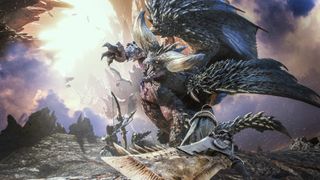
There's a good chance that Monster Hunter's popularity and fandom has blindsided you. Unless you're entrenched in Japanese pop culture or a huge fan of handhelds like Nintendo's 3DS, Monster Hunter might seem like an obscure series made even more confusing by people wrongfully comparing it to Dark Souls (something I'm ashamed to be guilty of). But with Monster Hunter: World now out on consoles and arriving on PC this fall, the series has stepped out of its relative niche to become one of the most popular games in the West right now.
So what's the big deal? You fight giant dinosaurs with ridiculously large weapons—is that really what has people so excited? Not even close. There's so much more to Monster Hunter than meets the eye. If you're new to the series and wondering if Monster Hunter: World is for you, this primer will walk you through the basics, helping you understand why this game has a fanbase that easily rivals videogame greats like Pokémon—definitely not in size, but in passion and loyalty.
A hunter's life for me
Monster Hunter is obsessed with creating a realistic ecology of fantasy creatures that behave exactly like you'd expect animals would.
Monster Hunter's concept is self explanatory. Each game drops you into a Jurassic-feeling world teeming with fantastical life—fire-breathing dragons and giant poisonous spiders. By killing them, you earn crafting materials that can be turned into powerful weapons and sets of armor to help you take on increasingly tough monsters.
But this isn't just a boss-rush game like Shadow of the Colossus where you kill one monster and then move onto the next. Instead, Monster Hunter is obsessed with creating a realistic ecology of fantasy creatures that behave exactly like you'd expect animals would. They feed, rest, defend their kin, and retreat when wounded. It's that ecological bent that gives Monster Hunter so much life and charm. As a hunter, your interactions with that environment are modelled after the lifestyle of our prehistoric ancestors. You'll kill, sure, but you'll also gather plants and create useful tools to aid you in the hunt.
You can also call on up to three friends to help you. Monster Hunter is a much livelier experience playing as a group, and your strategic options for hunting are expanded with more teammates. If you prefer playing solo, however, Monster Hunter won't punish you. Fighting alone will be more challenging, but every quest and monster can be completed by yourself—and many players prefer to play that way.
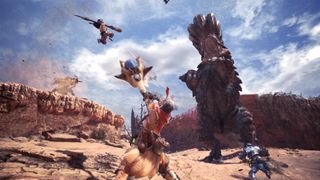
Prep work
Playing Monster Hunter is broken into two basic and very different phases: preparation and execution. If you're on the fence about buying World when it comes out on PC, know that these two phases are inextricably linked. There's no way to skip one if you just want to focus on the other—Monster Hunter is a take it all or leave it kind of game. If you're new to the game and think you can just walk up to the electrically-charge Kodachi with only your reflexes to save you, you're going to have a terrible time.
Each time you take on a quest to hunt a large monster, you need to come prepared. This is where a lot of the depth comes in, as Monster Hunter has a deep crafting and gathering system. While exploring each of the large zones, you'll encounter all manner of smaller beasts and local flora that can be harvested to create necessary consumable items. Herbs, for example, are turned into life-restoring potions. But if you gather some honey from a bee's nest, you can create a much more powerful super potion.
The biggest gaming news, reviews and hardware deals
Keep up to date with the most important stories and the best deals, as picked by the PC Gamer team.
The preparation phase might sound boring at first, but it's a relaxing contrast to Monster Hunter's intense brawls.
It's simple in that most items only take one or two ingredients to craft, but there's almost a hundred items that are useful on your hunts. Blue mushrooms and Bitterbugs can be combined to make antidotes to heal poison. Ivy and spiderwebs can be combined to make nets, which combined with a store-bought trap tool can make a net trap capable of pinning a monster down for some time. The list goes on and on. Any good hunter will soon have dozens of these possible recipes memorized in short order.
These consumables are necessary because the monsters you hunt are vicious. Not only do they hit like a truck, many also inflict deadly blights that eat away at your stamina or health. Each one also possesses amazing agility, and you'll want to use items to pin them down so you can score hits—especially if you're using slow weapons like the Great Sword.
This preparation phase also extends to actions you perform back in the safety of the village. There you'll cook meals to boost your stats, manage a farm that passively grows crafting items that you might need, craft and tinker with armor sets that provide various passive bonuses, and set out to complete optional quests that don't directly involve hunting, like gathering certain resources or exploring a new area. This is all a prelude to help give you an edge in the white-knuckle fights against the deadly beasts stalking the wilds.
The preparation phase might sound boring at first, but it's a relaxing contrast to Monster Hunter's intense brawls. Monster Hunter: World has almost 30 unique creatures to hunt, each one a distinct animal with its own behavioral patterns that you'll slowly acquaint yourself with each time you encounter them. Unlike a typical boss in a videogame, you're going to fight some of these creatures dozens—if not hundreds—of times, and each encounter will often teach you something new about the beast.
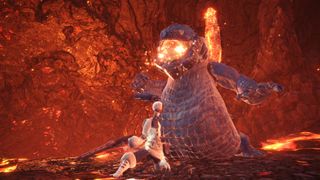
Big game hunter
The execution phase is where Monster Hunter truly shines. While people often liken the combat to Dark Souls because of its slow, weighted pace, it's far more akin to a basic fighting game. Each of the 14 extremely diverse weapons in Monster Hunter: World have their own combos to memorize and there's a satisfying amount of depth to how you can string those combos together.
Take the Charge Blade for example: This hybrid weapon builds power in the sword and shield mode before switching to the axe mode to unleash that power and deal obscene amounts of damage. But there's a ton of minutiae to learn. Certain attacks give you automatic blocking frames, protecting you from a surprise hit from a monster, for example. It's a stark contrast to the Dual Blades, a highly-aggressive weapon that relies solely on mobility to survive. Good Dual Blade users will have an innate understanding of invincibility frames and can read each monster's attack. And that's just two of the potential 14 weapons to master—including three ranged options.
What makes Monster Hunter so thrilling is that you're leveraging a deep combat system against monsters that are equally as deep. Each one behaves differently in battle and you'll always feel like you're struggling to keep up with their attacks. The Tzitzi-Ya-Ku has retractable frills that emit bursts of light that will stun your character if you look at them, while the Paolumu is a rat-like wyvern that inflates its neck to float around and fire bursts of pressurized air to knock you down.
When attacking, you need to be smart about where to focus your damage. Every monster has weak spots and organs that can be destroyed, limiting their abilities while also providing extra materials for armor crafting. The Rathian, for example, has a deadly tail-swipe that inflicts poison, so chopping off its tail is always a good idea.
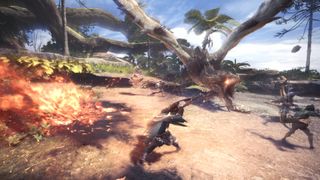
Because these are actual creatures and not just treasure-protecting bosses, monsters will frequently flee combat if they take too much damage. It sounds annoying, but you'll be thankful for the breather. Each fight is like a boxing match, and the pauses in between rounds provide a necessary moment to heal or eat food to regain stamina. Weapons become dull the more you use them, eventually bouncing off a monster's tough hide. Finding a moment to sharpen your blade is always tough.
Like a real hunter, you quickly learn to respect these creatures.
What's fascinating about this is that, like Pokémon, players begin to develop a deeply personal relationship with certain monsters the more they fight them. Each one is so distinct, so packed full of personality, that they ascend beyond mere videogame bosses and become something more. Like a real hunter, you quickly learn to respect these creatures.
That's where the preparation phase leading up to these fights becomes so necessary. To even the playing field, you might equip armor that grants you a resistance to being stunned or you might use a weapon that deals slashing damage so you can destroy the Tzitzi's flash-frills. If you're playing with a party, you'll coordinate to lay traps. One player using a bow might hit the Paolumu with sleep arrows while another lays barrel bombs at its head for a rude awakening.
You might be wondering if there's any point to killing these monsters beyond the mere satisfaction of doing so, which leads us to probably the best part of Monster Hunter. If you're a sucker for good-looking armor, Monster Hunter is unparalleled.
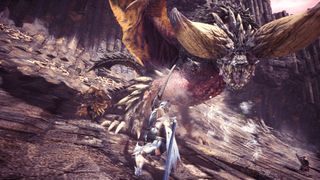
Fashion Hunter
Each beast you kill in Monster Hunter can be carved to retrieve valuable crafting materials to make new weapons and armor, and each creature has an associated armor set that captures the look and feel of the beast. This is the core progression through the game, as sets from tougher monsters provide better stats.
But what's great about Monster Hunter's armor system is that even weaker sets can be useful. Each individual piece of equipment has elemental resistances and an armor skill that provides you a passive bonus that can make hunting specific monsters much easier. While it's tempting to bring your tankiest armor into a fight, you'll be far better off bringing armor that counters the elemental damage of a monster or provides useful skills like mitigating its poison attacks.
The materials you earn from carving a monster are random, so Monster Hunter can feel akin to games like Destiny 2 where you're grinding the same monster again and again for a specific reward. It can be frustrating, but there are ways of influencing the randomness in your favor. Each monster has organs that, when broken, will reward you with a specific material, and in World, you can take Investigation quests that guarantee a drop of a specific rarity. It's a significantly better system than Destiny 2’s because Monster Hunter ties your rewards directly to your skill as a hunter.
Weapons are somewhat similar, but follow a progression tree that branches outward offering different types of elemental damage. You can't just forge the best weapons, but have to work your way up the tree crafting weaker variants first. Players will often have several of one weapon type, each suited for a different kind of monster.
That's still just the tip of the iceberg when it comes to equipment, as armor can also be upgraded to boost defenses, armor abilities can be stacked to increase their effectiveness, and wearable charms can be crafted to grant extra abilities. It's a lot to take in, but if you love that aspect in RPGs, Monster Hunter has one of the best systems I've ever seen.
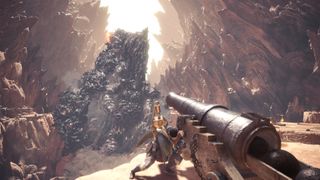
It's that unique cycle of preparation, execution, and reward that makes Monster Hunter such a fun, compelling experience that inspires players to sink hundreds of hours into each game. Similar to Pokémon, Monster Hunter has a time-tested formula for fun but keeps things fresh by adding new monsters and worlds to explore with each new game. There's so much depth to each system that mastering every weapon and crafting every set could keep you playing for months. What's better, recent Monster Hunter releases have all benefited from a constant string of post-launch DLC that's free, adding new monsters, challenges, and fun crossover armor styles from other games.
As someone who has played for years now, Monster Hunter has become one of my most beloved series. And while its combat or crafting won't appeal to everyone, those looking for a rich and deep multiplayer action RPG that lets you grind at your own pace should give it a try. Monster Hunter: World is the most accessible the series has ever been, making it a great entry point for new players. While it's not out on PC until this fall, the console version is nearly everything I hoped it would be.
With over 7 years of experience with in-depth feature reporting, Steven's mission is to chronicle the fascinating ways that games intersect our lives. Whether it's colossal in-game wars in an MMO, or long-haul truckers who turn to games to protect them from the loneliness of the open road, Steven tries to unearth PC gaming's greatest untold stories. His love of PC gaming started extremely early. Without money to spend, he spent an entire day watching the progress bar on a 25mb download of the Heroes of Might and Magic 2 demo that he then played for at least a hundred hours. It was a good demo.

Amazon's Mass Effect TV show now in 'active development' from the writer of F9: The Fast Saga (the one where a car goes to space)

Take-Two CEO says Grand Theft Auto 6 is on track for 'fall' next year, GTA 5 has sold over 205 million, and 'PC will be more and more a part of [our] business going forward'
Most Popular

